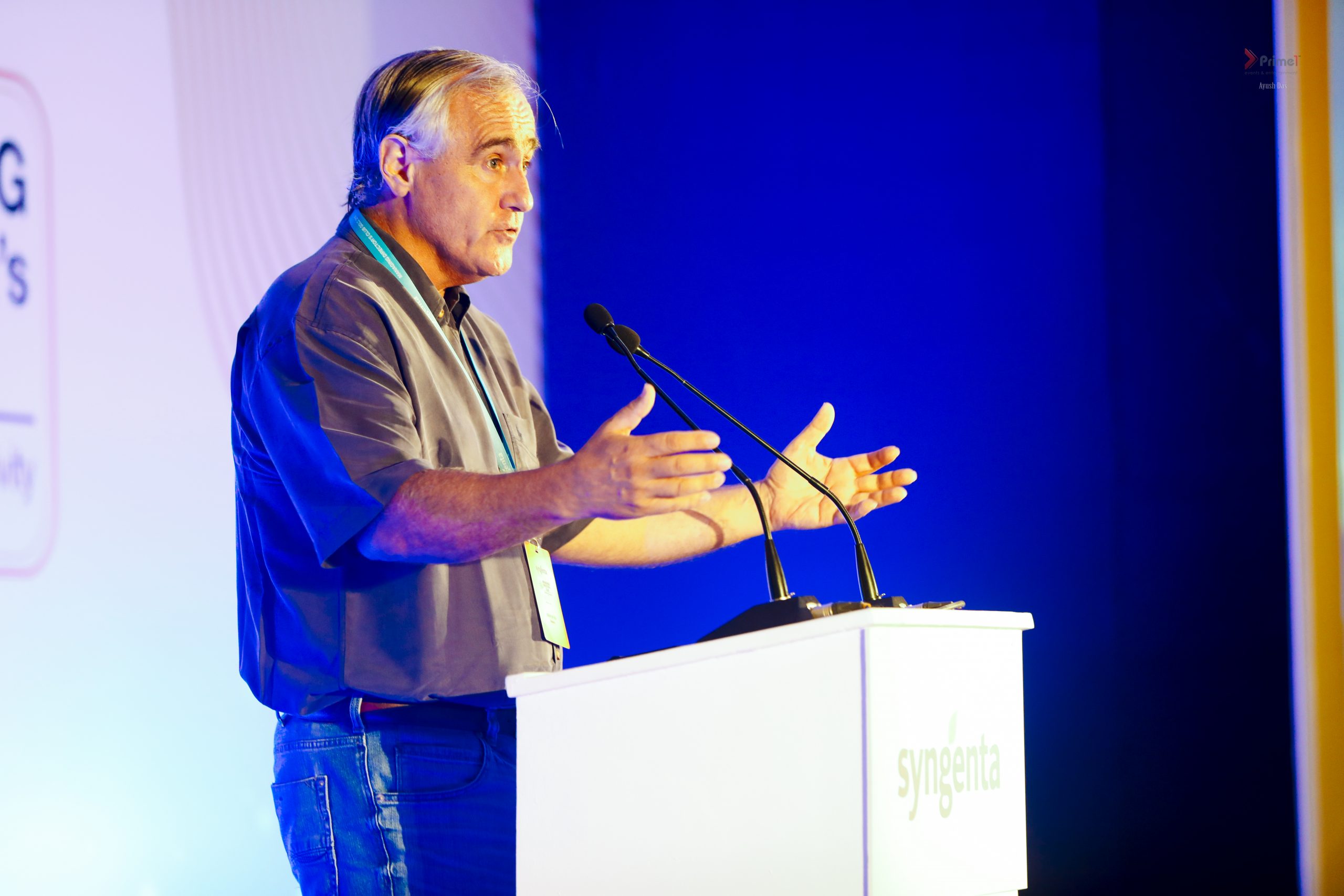Global agribusiness giant Syngenta helps farmers worldwide maximise their resources and increase crop yields. This can be especially important in developing countries like India with a large population. We speak with Rafael del Rio, managing director Syngenta India Private Limited, to discuss the benefits and challenges of his work.
Headquartered in Basel, Switzerland, with origins in the 18th Century, Syngenta is one of the world’s leading agriculture innovation companies. Its solutions and services enable farmers to withstand the various biotic and abiotic stresses threatening their crops. The company’s emphasis on research and development not only increases productivity but also reduces input costs and bolsters returns on investment. The company has been operating in India since 2000 and is headquartered in Pune with research stations spread across the length and breadth of the country.
Rafael Del Rio joined Syngenta in 1997, beginning as head of Chile and Bolivia. In 2000 he moved to Sao Paulo, Brazil as crop customer manager building the fruit and vegetables strategy for Latin America. He then spent six years (2003-2008) as the company’s GM in his native Chile, during which time he established his credentials by growing Syngenta Chile to a 21% market share and significantly increasing profitability. Several regional promotions then followed, until he took up his present role in April 2018, a position he approached with confidence.
“I think I understand the Syngenta culture very well,” Rafael says. “This comes from working for the company for so many years and that understanding feeds into all that I do. At the centre is the farmer. This is key to everything, and internally it is all about teamwork. That is what we have been implementing in India.”
The company is highly structured, as one might expect of a global giant. While Rafael is responsible for India, his role is also to coordinate with the Asia Pacific Region and Global to drive mutually agreed plans.
“The Syngenta leadership team is the one that drives all the decisions for India,” he explains. “This is not a one-man band. It is a team-based focus, and this is what I have brought to India. The team ethos has become embedded over the last four years, and I think the results are clear.”
With its core mission in the India to make crops more efficient and rescue more farmland, Syngenta India has shown impressive growth in a short space of time. Farmers across India have accessed Syngenta products to significantly boost their productivity, and therefore their livelihoods, sometimes by as much as 50%. Not only is this good for the business of Syngenta, but also for the country. Operating within an emerging economy, Indian smallholders have been economically uplifted by Syngenta’s growing presence.
“The agricultural sector in India faces a complex set of challenges,” Rafael explains. “As agriculture is the primary source of livelihood for over 50% of India’s population. Rainfall dependency coupled with climate change risk and limited access to capital and technology are real threats to productivity. We seek to address all those challenges by taking a ‘think like a farmer’ approach.”
The company’s ongoing success in India is built on certain key principles. Syngenta has invested close to $14 million in field research and development in India with employment of 140 scientists across four research stations.
The company also has initiated a variety of CSR initiatives, including its flagship I CLEAN programme.
“Yes, I CLEAN is something of which we are very proud,” Rafael explains. “It stands for inculcating cleanliness, learning, education, awareness and new habits. It addresses the needs of small villages and rural communities. It helps strengthen their economies, provides a better quality of life, builds, and utilises available local assets. The project complements the Indian government’s mission of doubling farmer’s Income by 2022.”
Since I-CLEAN, was initiated, in 2014, Syngenta has completed 23 projects in Bihar, Karnataka, and other parts of the country equipped with sheds, water facilities, toilet blocks, solar lights, and other amenities. The physical infrastructure is also utilised to educate and teach children in some places. Overall, the livelihood of the farming community has increased by 40 percent in these markets. Other Projects aimed at providing safe drinking water, soil health, and solar electrification have also been implemented in different parts of the country.
Underpinning all of this work lies the Syngenta attitude to people.
We are a very people-oriented company.
“We are people oriented in the way we deal with the farmers. We have a ‘think like a grower’ approach. What do these people need to help them be more productive? That is the question which drives us. We are also people centred with our employees. A business like ours is so rooted in the human experience. Everybody eats and everybody want to have enough to eat. It’s such a people focused thing, so that feeds directly into our culture.”
Never is this element of Syngenta’s corporate identity demonstrated more clearly than when serious challenges are faced, such as the advent of the corona virus pandemic. Rather than shoring up its own finances, Syngenta took a step-by-step approach, geared towards assisting its employees and partners as much as possible.
“When Covid 19 happened, we started with precautionary measures,” Rafael says. “We started talking to farmers and educating them, to maintain hygiene at their houses and fields. In some cases, it was basic things, like promoting handwashing and ensuring there were facilities available for that. As we went along, we learned, and we took measures to ensure the business continued running, while always thinking about safety. Look after yourself, look after your family, then think about work. This is what we said to our people.”
The company set up a 24×7 call centre, with toll-free access for farmers across 13 states, whose queries and concerns were answered through 16 dedicated lines, in nine Indian regional languages. The call centre associates responded to the questions on safety, precaution, crop management, market linkages and COVID care.
“The other significant intervention which we simultaneously undertook was food distribution for farmers who lined up at the markets waiting for long hours to sell their harvest. Through this initiative, we have served around 3,00,000 farmers in over 100 markets in 11 states during the lockdown phase, Rafael adds.
Identifying the acute shortage of medical equipment in the country, Syngenta air lifted a CT Scan machine from Japan to a remote village in the state of Madhya Pradesh severely affected by the Covid Pandemic. It also made available, medical beds to hospitals across the country besides providing, among other things, 1,000 litres of sanitisers to the frontline personnel of police, health workers, and municipal authorities.
“This kind of thing is very important to us. If our farmers need help in their communities, naturally we provide that if we can,” Rafael explains.
Of course, the pandemic also carried serious implications for supply chain function, across many market sectors. Like the rest of the world, Syngenta India encountered some difficulties with this, but overcame them due to the stable and longstanding relationships it has cultivated with supply chain partners.
We don’t just work with our partners, we invest with them.
“We assure them that if they follow the Syngenta protocols and what they deliver has the quality that Syngenta is looking for, then long term contracts will follow. We like to work with our supply chain partners in this way. We grow, and they grow with us.”
This is particularly important in the developing world, where Syngenta’s ability to allow partners to share the company’s upward trajectory can have hugely beneficial impacts on local economies. This fact is one which makes Rafael proud.
“We invite them to join us,” he says, “on our journey of future growth. It’s very important for us. Together, we can then improve the agrochemical industry in India. Also, the strength of these relationships means that during recent times, with lots of pandemic related difficulties, freight prices going up for example, we were well positioned to mitigate these. This is where you can see how strong our relationships are. Syngenta is built on this.”
Sustainability, of course, is also increasingly important throughout the modern world, a fact of which Syngenta is fully aware. The company knows that environmental concerns must be addressed and so sees them, and awareness of them, as being central to Syngenta’s ongoing success story.
“Our key supply chain partners are not only those we have formed stable relationships with, but those who have the ability to match our goals on the environment,” Rafael explains. “Our aim in the next three to five years is to make Syngenta the number one company in terms of closeness to the farmer. If we do that, everything else will follow. Of course, there are other things, too. We want to bring more new products to the market and strengthen our ties with the government. These things together will help to secure a sustainable environment.”
Rafael has witnessed the growth in the Indian market during his time there and is excited by the growth potential for the future.
“With India estimated to add half a billion people by 2050, farmers will have to grow crops more efficiently, conserve existing land, improve biodiversity and most importantly integrate the vast multitude of smallholders currently holding less than two hectares into the mainstream of the developmental process,” he explains.
However, his excitement is married with a sense of responsibility, acknowledgement that this growth must be responsibly managed.
“Everybody should have their eyes on this region,” he says. “Because we have a big opportunity for India to become a global player. But climate change is here, we can all see that, and that impacts crops and other elements of our business. We are not here to do business only. We are here to create the environment to do good business. That means economic growth and sustainability. The two have to go together.”
Click here to read and download the full article.









